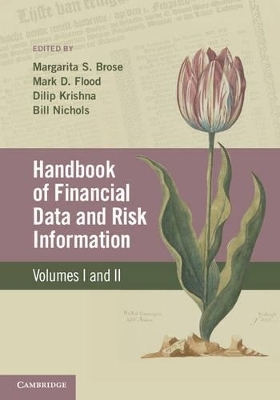
Handbook of Financial Data and Risk Information 2 Volume Hardback Set
Cambridge University Press
978-1-107-69070-7 (ISBN)
- Titel z.Zt. nicht lieferbar
- Versandkostenfrei innerhalb Deutschlands
- Auch auf Rechnung
- Verfügbarkeit in der Filiale vor Ort prüfen
- Artikel merken
Risk has always been central to finance, and managing risk depends critically on information. As evidenced by recent events, the need has never been greater for skills, systems and methodologies to manage risk information in financial markets. Authored by leading figures in risk management and analysis, this handbook serves as a unique and comprehensive reference for the technical, operational, regulatory and political issues in collecting, measuring and managing financial data. It will appeal to a wide range of audiences, from financial industry practitioners and regulators responsible for implementing risk management systems, to system integrators and software firms helping to improve such systems. Volume 1 examines the business and regulatory context that makes risk information so important. Volume 2 describes a structural and operational framework for managing a financial risk data repository.
Margarita S. Brose has 20 years of experience in financial services. She began her career as an attorney at the US Securities and Exchange Commission. After earning an MBA, she specialized in risk and compliance consulting with PwC and IBM. She has degrees from Barnard College, George Washington University Law School and The Wharton School. Mark D. Flood did his undergraduate work at Indiana University in Bloomington, where he majored in finance (BS, 1982), and German and economics (BA, 1983). In 1990, he received his PhD in finance from the Graduate School of Business at the University of North Carolina at Chapel Hill. He has worked as a Visiting Scholar and Economist in the Research Department of the Federal Reserve Bank of St Louis, an Assistant Professor of Finance at Concordia University in Montreal, a Visiting Assistant Professor of Finance at the University of North Carolina at Charlotte, a Senior Financial Economist in the Division of Risk Management at the Office of Thrift Supervision, a Senior Financial Economist with the Federal Housing Finance Agency, and most recently as a Research Principal with the US Office of Financial Research in Washington, DC. His research interests include financial markets and institutions, systemic financial risk, financial data management, securities market microstructure, and bank market structure and regulatory policy. His research has appeared in a number of publications, including the Review of Financial Studies, the Annual Review of Financial Economics, the Journal of International Money and Finance, Quantitative Finance, and the St Louis Fed's Review. Dilip Krishna is a Director with the Governance, Risk and Regulatory Consulting practice at Deloitte and Touche LLP, with a focus on risk architecture and information. He is involved in several regulatory initiatives such as stress testing and capital management implementations. He has seventeen years of experience across a range of wholesale and retail banking products in banks across North America. Previously, Krishna was a partner with Teradata Corporation, leading its North-East Banking and Capital Markets consulting team. He worked with many large banks in the North-East to implement some of their largest data warehouse and data management programs. Krishna was also Director of Teradata's Risk Management Center of Expertise in the Americas, responsible for working with many large financial institutions across the USA and Canada implementing Basel II and risk management solutions. In this role he was also active with Teradata's Government Services team, helping to articulate the role of analytics in regulation and transparency, including being called upon to offer expert testimony to the US Congress. He has served as chief architect for Basel II at a major Canadian bank, and has implemented front-offices trading solutions in Canadian capital markets operations. Krishna is widely published in the area of risk information and risk architecture. Bill Nichols has been at the intersection of technology and finance for twenty-five years. He co-founded and served as CEO of a research firm acquired by Thomson Financial in 1995, and spent the following seven years with Thomson. Subsequently, he spent three years in venture capital related organisations, followed by consulting stints for major banks, asset management firms, and securities exchanges. He has participated as an expert in multiple ISO standards groups and is the former Convenor of the ISIN Standard for financial instruments. With Mark Flood, he co-chaired the Data Committee of the Committee to Establish the National Institute of Finance. Currently a Senior Advisor for Information Architecture and Innovation at the Office of Financial Research, he was previously Data Architect at Bridgewater Associates in their Data Research group.
Volume 1: Preface; Part I. Risk Management Context for Financial Data: Introduction Margarita S. Brose and Mark D. Flood; 1. A brief history of financial risk and information Mark D. Flood; 2. Risk management Robert Mark and Dilip Krishna; 3. Portfolio risk monitoring Clifford V. Rossi; 4. Frameworks for systemic risk monitoring Alan King, John C. Liechty, Clifford V. Rossi and Charles Taylor; 5. Data-driven regulation and financial reform: one perspective from industry on the financial crisis John C. Pattison; Part II: Requirements and Sources for Financial Risk Management: Introduction Bill Nichols; 6. Banking and financial activities in the real economy Jefferson Braswell and Robert Mark; 7. Capital markets data Martijn Groot; 8. Capital markets reference data Marc Alvarez; 9. Risk management data and information for improved insight Margarita S. Brose, Mark D. Flood and David M. Rowe; Part III. Regulatory Data: Introduction Margarita S. Brose and Mark D. Flood; 10. A history of financial regulation in the USA from the beginning until today: 1789 to 2011 Alejandro Komai and Gary Richardson; 11. Data for microprudential supervision of US banks Mark D. Flood, Simon Kwan and Irina S. Leonova; 12. Microprudential supervisory data in the USA: securities and derivatives Margarita S. Brose and Jesse T. Weintraub; 13. Financial data and risk information needed for the European system of financial supervision Per Nymand-Andersen, Nicola Antoniou, Oliver Burkart and Jarl Kure; 14. Data needed for macroprudential policymaking Laura Kodres; Index. Volume 2: Preface; Part IV: Data Operations in Financial Institutions: Introduction Dilip Krishna; 15. Financial market participants John Carroll and Jonathan Sparks; 16. Functional model for financial data and risk information Janine Forsythe; 17. Financial institutions' data requirements Dianne Buonincontri and Nicholas Robson; 18. US residential-mortgage transfer systems: a data-management crisis John Patrick Hunt, Richard Stanton and Nancy Wallace; Part V. Data Management Technologies: Introduction Martijn Groot; 19. Financial data interchange standards Karla McKenna, Jim Northey and Bill Nichols; 20. Data storage and processing Dilip Krishna; 21. The extracting, transforming and transmitting of data Martijn Groot; 22. The visual analysis of financial data Victoria L. Lemieux, Brian Fisher and Thomas Dang; 23. Metadata management Marc Alvarez; 24. Data Security and privacy Michael J. McCabe; Part VI: Implementation of Data and Analytics: Introduction Dilip Krishna; 25. Project implementation Margarita S. Brose and Dilip Krishna; 26. Operations management Jim Blair; 27. Data governance and data stewardship Deborah Stockdale; Index.
| Erscheint lt. Verlag | 9.1.2014 |
|---|---|
| Zusatzinfo | 80 Tables, black and white; 15 Halftones, unspecified; 140 Halftones, color; 10 Line drawings, unspecified |
| Verlagsort | Cambridge |
| Sprache | englisch |
| Maße | 178 x 254 mm |
| Gewicht | 2800 g |
| Themenwelt | Wirtschaft ► Betriebswirtschaft / Management ► Finanzierung |
| ISBN-10 | 1-107-69070-6 / 1107690706 |
| ISBN-13 | 978-1-107-69070-7 / 9781107690707 |
| Zustand | Neuware |
| Haben Sie eine Frage zum Produkt? |
aus dem Bereich


